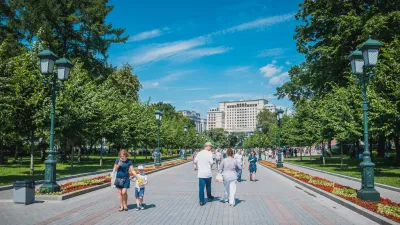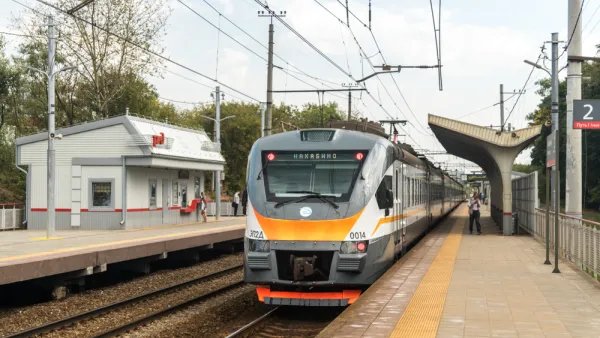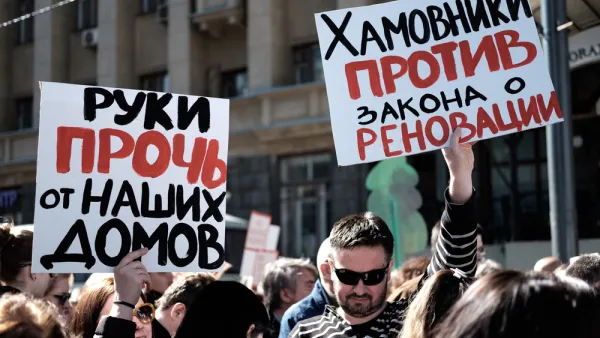Moscow's Mayor has pushed an agenda to beautify the city, create social spaces, and make the city more walkable, but critics see the move towards walkability as more of a forced march.

Moscow has embraced new urbanism and all of it's benefits: pedestrian friendly streets, public spaces, and beautiful landscaping creating an inviting public realm. However, critics of the program to transform the city have noted that the makeover is leaving out or ignoring the input of the city's population. Maria Antonova of Foreign Policyreports that the changes to the city's infrastructure have been quick, sweeping and often done without any warning. While detractors of Moscow Mayor Sergei Sobyanin say the $2 billion city beautification project has been undemocratic, the mayor's backers note that the program is European in outcome, "but its realization is more Asian."
“In Paris or New York it takes two years to redevelop one street: they talk to the residents, they do a test segment, and finally do the actual work,” Muratov said. In Sobyanin’s Moscow, changes are sudden and often unpredictable, with residents treated like minor inconveniences in a process that is moving through the city like wildfire.
...Sobyanin is trying to create social spaces — places where people can enjoy themselves in a pleasant and relaxed environment. These are different from public spaces, where citizens can engage in activities that might make authorities uncomfortable.
“A space can be physically comfortable even in any dictatorship,” Muratov said. “Streets are nice in Singapore.”
Antonova reports that the efforts to remake the city have also resulted in a reigning in of street performers and artists, the removal of the city center's popular trolleybuses, and the destruction of retail kiosks. However, protests of the forced urban renewal have been stifled, with Antonova reporting that some 200 applications to hold protests of the trolleybus removal being denied by the city.
FULL STORY: Vladimir Putin’s Walkable Streets

Analysis: Cybertruck Fatality Rate Far Exceeds That of Ford Pinto
The Tesla Cybertruck was recalled seven times last year.

National Parks Layoffs Will Cause Communities to Lose Billions
Thousands of essential park workers were laid off this week, just before the busy spring break season.

Retro-silient?: America’s First “Eco-burb,” The Woodlands Turns 50
A master-planned community north of Houston offers lessons on green infrastructure and resilient design, but falls short of its founder’s lofty affordability and walkability goals.

Test News Post 1
This is a summary

Analysis: Cybertruck Fatality Rate Far Exceeds That of Ford Pinto
The Tesla Cybertruck was recalled seven times last year.

Test News Headline 46
Test for the image on the front page.
Urban Design for Planners 1: Software Tools
This six-course series explores essential urban design concepts using open source software and equips planners with the tools they need to participate fully in the urban design process.
Planning for Universal Design
Learn the tools for implementing Universal Design in planning regulations.
EMC Planning Group, Inc.
Planetizen
Planetizen
Mpact (formerly Rail~Volution)
Great Falls Development Authority, Inc.
HUDs Office of Policy Development and Research
NYU Wagner Graduate School of Public Service



























